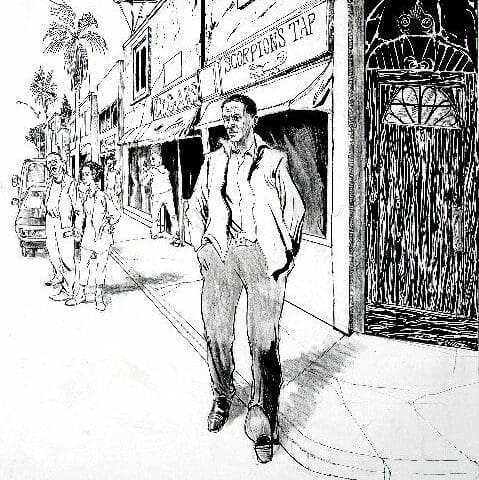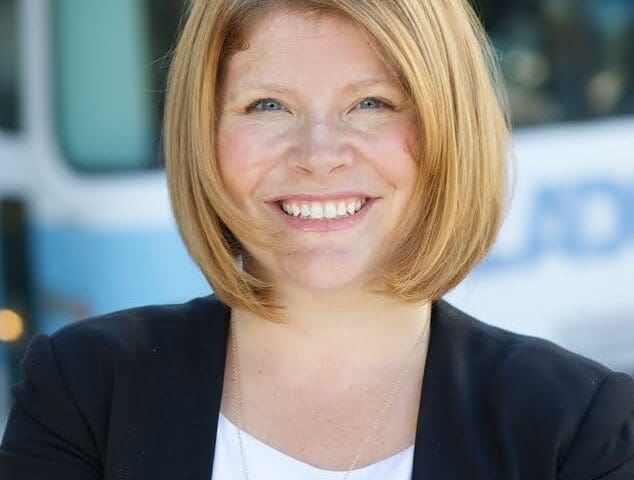

I’m currently taking an Occidental College class called Community Organizing – a required class for my Urban and Environmental Policy major. We’ve spent the last couple of weeks learning about what it means to bring about change – the planning that needs to go into it, the necessary time commitment, the different levels of power you need to take into account.
To be completely honest, I’m still figuring out whether I consider myself an activist. Am I someone who is engaged in bringing about change? I’m not sure.
That’s when I had the opportunity to interview a modern-day community organizer and change-maker: Pastor Norma Jean Patterson.
She made it clear that life-changing community organizing continues today, and made the historic leaders we talked about in class much more tangible in my mind. In the hour she spoke, she did more than just tell me her story, she moved me to understand the simpler concept underneath all the issues of community organizing: the power of loving people.
» Read more about: Community Organizing: Making it Real, from L.A. to East St. Louis »
Dino Degrassi and Jason Campbell engage in dialogues for a living. They also put the electrical wiring into some of Los Angeles’ largest and most recognizable building projects. Every morning at 6:30 the two electricians ride the street level elevator down into the construction site at Wilshire and Figueroa, where the core of the Wilshire Grand hotel is emerging out of the ground. When finished, the 73-story building will be the tallest west of the Mississippi.
Degrassi is a seasoned journeyman – ostensibly a teacher of apprentices like Campbell who work their way through a five-year program, learning as they go.
Throughout the day, the men’s hard-earned craft knowledge guides their conversation. “I try to help Jason work efficiently,” Degrassi says, as he moves along a cement deck tying in conduit. “I want to make sure he paces himself and doesn’t get hurt.”
“There’s a lot of wisdom to be learned from Dino,
» Read more about: Let’s Talk – Socrates at the Wilshire Grand »


 Seventy-three percent of polled Americans believe that corruption in government is widespread. That’s a lot of distrust. And it leads to a lot of cynicism. A big chunk of that corruption comes from the revolving door of politics, greased by money so great it would make most of us faint-of-heart.
Seventy-three percent of polled Americans believe that corruption in government is widespread. That’s a lot of distrust. And it leads to a lot of cynicism. A big chunk of that corruption comes from the revolving door of politics, greased by money so great it would make most of us faint-of-heart.
Pols move from elected office to big offices on Wall Street or to lobby firms in state capitals across the nation. Government regulators have often left the very industry they are charged with regulating to join a commission in the sector they are supposed to regulate. Later, they return to the same business they once worked for.
Of course these people are not making decisions in the best interest of the consumer, since even when they are on the government payroll they carry the acute awareness of soon returning to that corporate office. They want to regulate without annoying too many future employers.
At some point during the last decade, as various plans have been floated to avert climate change, it struck me that we’re focusing on the wrong problem. Global warming caused by a buildup of greenhouse gases in the atmosphere (carbon dioxide chief among them), has indeed sped us in the direction of rendering the planet uninhabitable for life, human and otherwise. But climate change is not a disease in itself. Instead, it’s a symptom of a disease, systemic and pernicious, brought on by squandering the parts of nature we call “resources” at a breathtaking clip and without restraint. All of the solutions on offer, from displacing coal with natural gas in the West to constructing more nuclear reactors in the South, are supposed to allow us to go living exactly as we do, without the consequences.
Except we can’t. As Naomi Klein, author of No Logo and the blockbuster bestseller, The Shock Doctrine,
» Read more about: Reviewed: Naomi Klein’s “This Changes Everything” »


 Detainees at the Northwest Detention Center, an immigrant detention center operated by GEO Group in Tacoma, Washington, initiated the first of repeated hunger strikes on March 7, 2014. A note from one of the hunger strikers passed to his lawyer read, “Please contact the local news. There’s 1,200 people not eating—better food, better treatment, better pay, lower commissary, fairness.”
Detainees at the Northwest Detention Center, an immigrant detention center operated by GEO Group in Tacoma, Washington, initiated the first of repeated hunger strikes on March 7, 2014. A note from one of the hunger strikers passed to his lawyer read, “Please contact the local news. There’s 1,200 people not eating—better food, better treatment, better pay, lower commissary, fairness.”
The story of the hunger strikers is documented in a new report released by Grassroots Leadership and Justice Strategies detailing how immigrants detained in privately run detention centers across the country are routinely exposed to shocking levels of violence, sexual abuse, neglect, filth and wrongful death.
The report titled For-Profit Family Detention: Meet the Private Prison Corporations Making Millions By Locking Up Refugee Families, exposes how Corrections Corporation of America and GEO Group are both banking on a massive expansion to immigrant family detention.
» Read more about: Lowering the Bars for Humane Prison Conditions »


“You don’t know what the hell you sayin’,” the red-eyed man blurted. He came off his barstool too fast, knocking it over as he did so. Drunk, he teetered over to Hank Dixon, who’d turned on his stool toward him but remained sitting.
“Best slow your roll, Al,” the one-handed bartender Pierre Gaston said languidly. He took hold of an empty glass between the pincers of his prosthesis. Behind him and above the bottles on a flat screen TV, played a near mute newscast about a truckers’ job action at the port.
“Oh, I’m’a slow somethin’,” Al Griffiths sneered, ignoring the advice. He stood close to the stockier Dixon; Griffiths’ beer and vodka chasers a heavy aroma in the other man’s nose. “You didn’t go around with Juanita. She wouldn’t have had anything to do with you, toilet seat fixer.”
Dixon squinted at his accuser as he sipped on his beer.
» Read more about: The Dixon Family Chronicles: “The Sink Man” »
» Read more about: Watch: Gary Phillips Discusses “The Dixon Family Chronicles” »
By now British films that combine gritty economic issues with musical set pieces have become their own genre. These movies, often based on historical fact, typically involve the seemingly crazy schemes of a plucky band of commoners to save a dying industry or rescue a besieged group of workers. Pride is the most recent descendent of Brassed Off, The Full Monty, Kinky Boots and Made in Dagenham. It’s the story of the fateful 1984-85 coal miners’ strike, during which Prime Minister Margaret Thatcher managed to cripple the National Union of Mineworkers.
Stephen Beresford’s screenplay follows the efforts of Mark Ashton (Ben Schnetzer), a young gay militant, to rally his LGBT comrades to collect funds for the increasingly harried miners. He finds only a few adherents, but this energized band, which includes a closeted young student named Joe (George MacKay), a sarcastic lesbian, Steph (Faye Marsay) and a flamboyant actor played by Dominic West,



The gains won by Los Angeles County social workers during their strike last December were nothing short of historic. Members of the Department of Children and Family Services (DCFS), through the Children’s Social Workers union (part of Service Employees International Union Local 721), may have begun a sea change for children and families in the county. As the nation’s largest public child welfare agency, DCFS is now poised to be a bellwether for reform.
The job of the county’s social workers is to establish child safety, coordinate and evaluate visitation, substance abuse, mental health and domestic violence services; locate relative or foster care placements; prepare the children and transport them to placements; and for dependency court cases, prepare and write the court reports that are the basis for DCFS’ legal recommendations in legal proceedings.
As a former DCFS Supervising Social Worker, I believe that the high number of pre-strike caseloads severely hindered the ability of social workers to adequately provide services to maintain children at home or to reunify children with their parents and conduct thorough safety assessments.
» Read more about: DCFS Strike Gains: Protecting Children, Standing Up for Social Workers »


Seleta Reynolds, Los Angeles’ new chief of transportation, wants to help break L.A.’s dependence on cars. She believes that bikes are key to doing it. New York City, the Bay Area and other metropolises have already begun to show that a mixed transportation network with a central role for bicycles can be achieved in America. But can bikes prosper in the most infamous car town in the world?
Before being hired by Mayor Eric Garcetti this summer, Reynolds helped lead San Francisco’s Livable Streets office in that city’s transportation agency. She sees a bit of L.A.’s future in San Francisco’s present.
“In San Francisco, people are truly multimodal,” she told Capital & Main. “They take taxis, they take Uber and Lyft. They ride their bikes, they take a bike-share. They take the ferry, they ride the bus, they take the Muni Metro. Sometimes they drive, they take car-shares.
» Read more about: A Bike Lane Runs Through It: L.A. Rethinks Transportation »